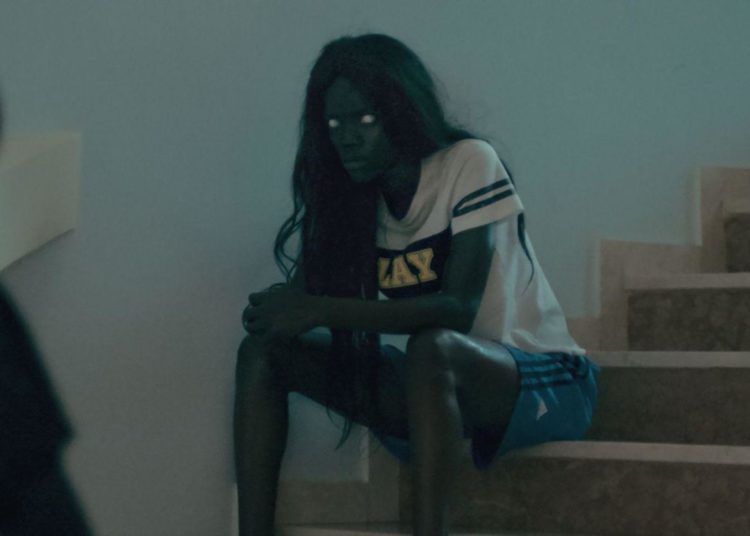This post is also available in: Français (French)
The narrow streets of Mina, the port city of Tripoli, harbor an international film festival. The northern capital is, however, the poorest in the country and one of the top 3 poorest cities in the Mediterranean basin.
Yet the surrealism of this pairing has been ongoing for the past 10 years. Professionals, photographers, and journalists dressed to the nines to attend the opening night of the Tripoli Film Festival on 21 September 2023.
Until September 29, a wide selection of international films and short films are being screened at the Beit el Fan cultural center. This building was built by the Crusaders in the 12th century.
In the short film category, women dominate the Lebanese productions. Leah Manasseh presents to us her grandmother, whom she filmed two weeks before her passing, in a poetic and intimate film, Leila and the Cigarette. In The Sun Sets on Beirut, Daniela Stephan goes looking for her cat in the rubble of the explosion. As for Marilyne Naaman, she takes us to Beirut in the middle of night in her film So Cool. This female presence reflects women’s heavy participation in the film industry.
Against all odds, this festival continues to stand as a symbol of the struggle of the movie sector in Lebanon. It must be noted that Lebanon went through the thawra (revolution) in 2019, the COVID-19 pandemic, the Beirut port explosion in August 2020, and a multidimensional crisis. As a result, production sites—and others—have been decimated, the Lebanese pound has lost 95% of its value, and 82% of the population lives below the poverty line.
In the face of this reality, artists have remained, have had to reinvent themselves. Proposing new ways of contributing to cinema, sharing films, and above all rediscovering lost spaces. And many of these projects and ideas have been put forward by women.
What the crisis changed
Professionals in this sector are categorical: the situation has always been difficult, and people working in film did not have to experience the crisis to have to create DIY movies with few resources. “But since 2019, there have been issues with electricity, with finding money, with the inability to withdraw money or get a loan from a bank…” lists Charlotte Schwarzinger, who is writing her doctoral thesis on the Lebanese film scene between 2019 and 2023.
Those who can have already left or are getting ready to leave. The rest can only dream of a better life elsewhere. Lebanon has recorded a massive wave of emigration, the third in the country’s history. “It’s not just directors who left. Technicians, people with unique and essential skills, they left too,” Schwarzinger explains.
Beyond the disorienting departures, there’s also the inability to plan ahead. “A film takes years to make. How can you plan for the future when everything around you is uncertain?” the researcher asks.
Make do with what we have
Rania Rafei, a director from Tripoli, experienced all these upheavals herself and covers them in her work. In a café in Mina, she shares her experience but also the revolution she’s been witnessing in Lebanese cinema since 2019.
“When the thawra started, I grabbed my camera and started filming. But I felt very alienated,” she says, then delving into an introspective account of her legitimacy and place as an artist, including a stint at university and the writing of a thesis.
Ever since, she has firmly defended the idea of “not doing like the West.” What used to be circumstantial has become protocol for her. “I can’t operate outside the market, but I don’t want to be dependent. So I make do with what I have,” Rafei affirms. A way of doing things that she seems to also notice elsewhere in the sector—“thanks to the crisis, which has given people new meaning.”
A multitude of ideas
The filmmaker lists the various initiatives that have been attempting to do things differently, to find these deserted spaces and, above all, the moments interrupted by crises. Starting with the rehabilitation of the Empire Cinema in Tripoli, at a point where the city no longer had any theaters. Empire Cinema, one of the city’s first, sits in the middle of Tripoli’s vibrant Tal Square, which encircles a clock tower.
In Beirut, there are multiple projects: Nation Station, the cinema club of the Lebanese Academy of Fine Arts (ALBA), FUEL, or even the movie nights organized at the Barzakh café-bookstore that screens independent films.
The Fondation Liban Cinéma was also launched to support Lebanese cinema and connect professionals. All these initiatives are reviving dialogue and counter the lack of funding. “We have nothing left to the point that we work together locally,” explains Charlotte Schwarzinger.
The spirit of cinema
Collaborative work is second nature for Sabine Sidawi. “I have always operated this way. I don’t like competition,” affirms this producer of documentaries and feature films.

Passion for cinema. This is what Sabine Sidawi has in abundance, flowing out with each of her words, confident reflections, and reassuring smile. Based in Beirut, she is part of a cinema cooperative that was set up in 2020, two weeks after the port explosion. “The revolution taught us that we shouldn’t wait for solutions to fall from trees. We must find them together,” she explains from the huge apartment being rented for the cooperative to work out of in the neighborhood of Furn el Chebbak.
Presently consisting of 7 people, the cooperative can hold up to 25 or 30 film professionals, allowing them to share knowledge and experiences and look for work and funding opportunities together. “The important thing is to come together and have our brains collaborate. We each have our own expertise, but we work individually,” laments the producer for whom “collective work is the spirit of cinema.”
This kind of sharing is second nature to her. Moreover, not only is she optimistic, she is determined: “You have to have hope. Making movies doesn’t require much, contrary to what capitalism would have you believe. This cannot last—we have to do things differently.” Her dream is for this cooperative model to be reproduced across Lebanon and for its structure to be “self-sufficient in 3 years.”
The IMDb (Internet Movie Database) of Lebanese cinema
A few neighborhoods down, in Mar Mikhael, Hania Mroué, the charismatic Director of the art house movie theater Metropolis Cinema, welcomes us to discuss the association’s new project. It promotes cinema in Lebanon and has always supported the protection of memory. It was therefore only natural for it to delve into the creation of a Cinematheque. “I call it an IMDb of Lebanese cinema,” the Director says, smiling. Currently, only a review of Lebanese films and directors is available on their website.
“After the website was launched, people started calling us to ask how they could watch the films,” Mroué recounts. This is how they got the idea to have a space for the cinematheque. For now, the films are only available on a server and can be accessed through a link only accessible in the Mar Mikhael locale. “The dream would be to one day have the means to make physical copies of these films and preserve them,” she continues.

Today, the Director is thinking of ways to work with other professionals. For her, the future lies in collaboration: “We are not competing. We are complementary. Our needs are so enormous that there is room for everyone,” she says.
More cautious, less funded, with a smaller circle, pooling knowledge, Lebanese cinema is using these survival tactics now more than ever. Though it experienced difficulties well before the past three years of crisis, these do seem to have ignited a multitude of personal and local revolutions.































